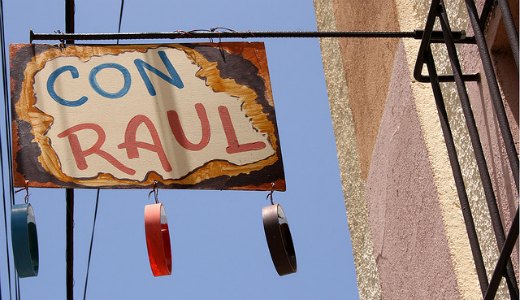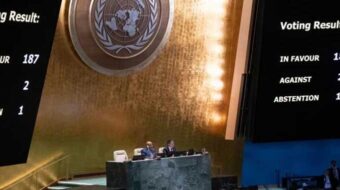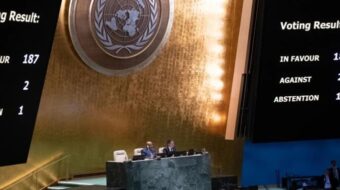
Cuban President Raul Castro Ruz broke new ground Aug. 1, giving a generally upbeat report on economic and other progress since the April congress of the Cuban Communist Party, but pointing out some deficiencies, and sharply criticizing the tendency of some state and party officials to allow old habits to become obstacles to change.
In his report to Cuba’s parliament, the National Assembly of People’s Power, Castro, whose formal title is President of the National Councils of State and Ministers, reported that in the first half of this year, the Cuban economy grew by 1.9 percent, and is on track to grow by at least 2.9 percent for the whole of 2011. Gains were registered in energy efficiency and crude oil production, and tourism. Also, “exports increased and imports decreased,” a key goal of current economic reform efforts. The long decline in sugar production was stopped.
Still, “a tense situation continues” in terms of Cuba’s ability to pay its international debts, but this appears to be on the way to resolution. President Castro was critical of “planning errors and a lack of coordination” in the fields of agriculture, food, heavy and light industry and the supply of construction materials. Castro warned that going into 2012, Cuba will still be negatively affected by high worldwide prices for food, fuel and other raw materials, and the world financial and economic crisis. He did not mention, in this speech, that in September drilling will begin off Cuba’s northwest coast for what may turn out to be a deep-water petroleum reserve of between 5 and 20 billion barrels. Once production from these resources comes on line, Cuba could become a net exporter of oil, radically changing the country’s economic prospects.
Castro used a very sharp tone to criticize certain party and government officials for their discriminatory behavior toward an unnamed female government employee and party member. These officials, who were also not named in the speech, had reacted badly when they found out that the woman was a churchgoer and had not told them so. The upshot was that she was transferred to a different job with lower pay. She appealed this decision to the president and cabinet on April 17. Upon investigation, the government found that she had been unjustly transferred and, in effect, demoted. Castro pointed out that article 43 of the Cuban constitution forbids discrimination on the basis of religion, race, gender and other things, nor was the compañera under any obligation to tell her supervisors about her religious beliefs and practices. The woman has been offered her old job back, with apologies.
Raul Castro roundly criticized the government and party officials involved for “the damage done to a Cuban family by attitudes based on an archaic mentality, fed by simulation and opportunism.” He pointed out that by creating disunity among the Cuban people, such sectarian attitudes harm the socialist project. “Many years ago our revolution overcame the scenes of confrontation with some of the religious institutions, a stage during which both parties committed excesses of greater or lesser magnitude. We are also aware of the enemy’s [i.e. imperialism’s] aspirations to foment confrontation and distrust between believers and the revolutionary process, calculations which have proved themselves erroneous because, from the outset, the vast majority of Cubans from modest backgrounds with religious beliefs supported the revolution.”
He evoked the name of Frank País, a revered martyr of the Cuban Revolution who was murdered by former dictator Fulgencio Batista’s henchmen on July 30, 1957, reminding his listeners that País had also been a religious believer.
In news that will be welcome to many Cubans, the president announced that the government is revising its emigration policy to make it easier for Cuban citizens to travel and settle abroad if they so desire. In the years immediately after the revolution, the United States had a concerted policy of inflicting a deliberate “brain drain” on Cuba, leading to, for example, the emigration of 3,000 of the 6,000 doctors practicing there on January 1 1959. Though this approach has not been completely abandoned by the United States, which still has a policy of trying to lure Cuban doctors away from the many overseas medical aid projects the Cuban government sponsors, Raul Castro also thinks that restrictive policies have outworn their usefulness. Castro said that easing restrictions occurs in a context in which the stranglehold of the first generation of extreme right-wing Cuban exiles over the politics of Cubans in the United States and elsewhere is weakening. But he reminded his listeners that the U.S. still maintains the “Cuban Adjustment Act” and the “wet feet-dry feet” policy that Cuba complains encourages risky surreptitious “rafter” phenomena.
Although Raul Castro did not talk about it in his speech, work is also underway to facilitate sale and purchase of houses by ordinary Cubans. Shortly after the revolution, the government put a stop to the private housing market so as to suppress exploitative landlordism and real estate speculation. This had made it difficult for Cubans who move from one city to another to get rid of their old houses and obtain new ones, which had to be done through a clumsy “swap” mechanism. Though it appears most Cubans are pleased with the change, it remains to be seen what measures will be added to prevent speculation in houses and consequent rises in home prices. According to the New York Times, would-be real estate speculators in Cuba are already gearing up for action.
Castro ended his speech by sending greetings to Venezuelan President Hugo Chavez, who is undergoing cancer treatment in Cuban institutions, and to the Cuban Five, patriots who are jailed in the United States for working to combat terrorist organizations in Florida.
Photo: Steve Mileham // CC 2.0












Comments